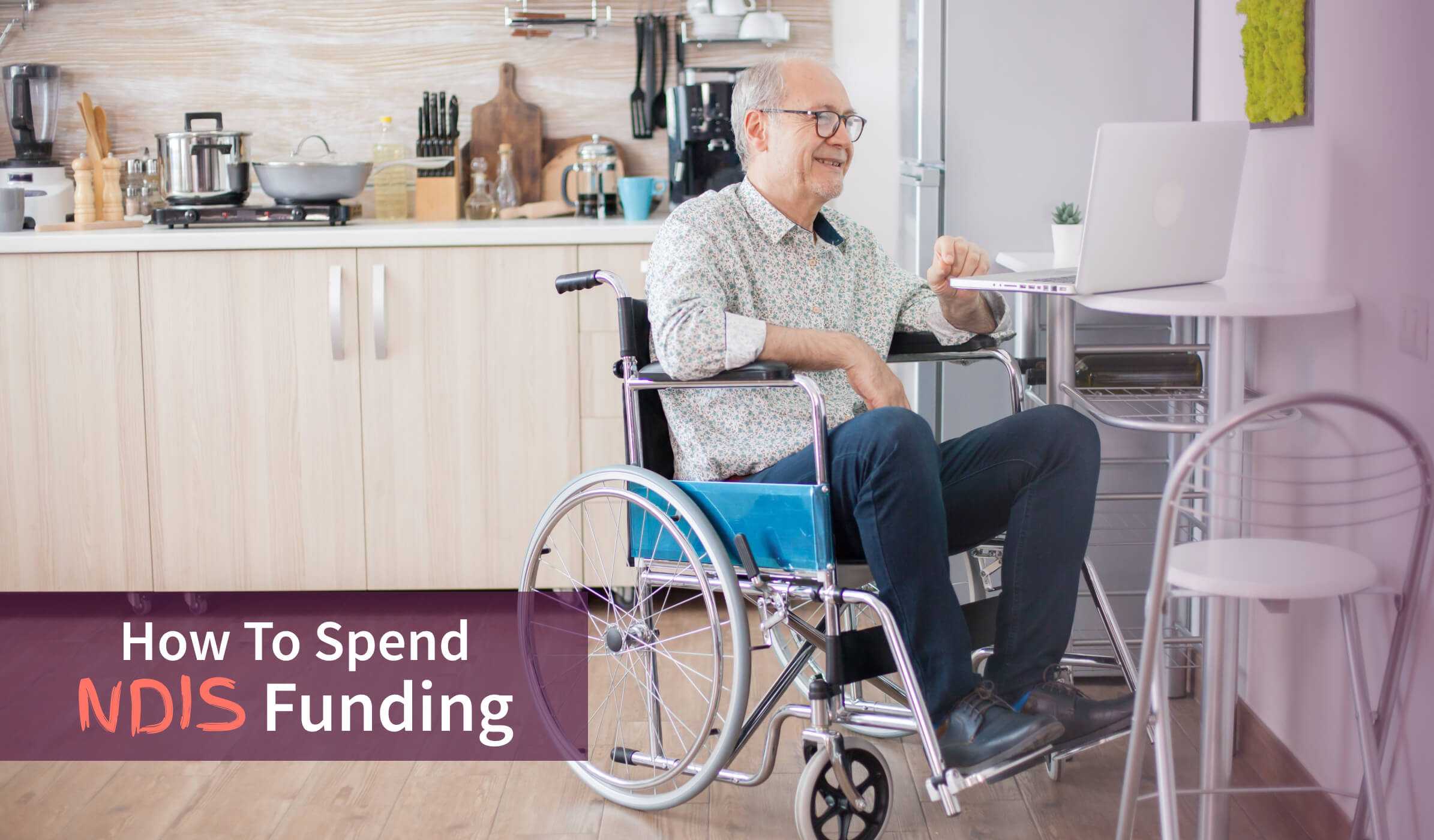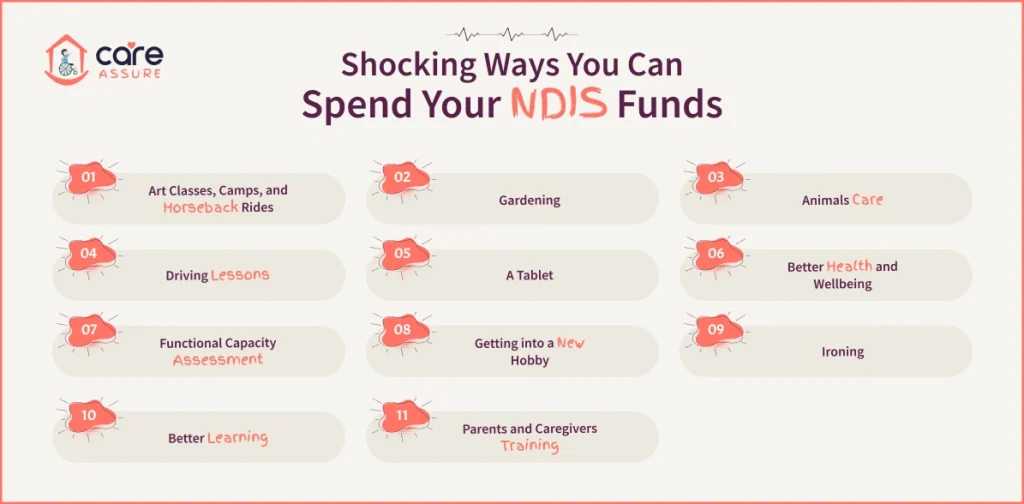How To Spend NDIS Funding
July 7, 2024
|By Careassure
|11 min read
Table of Contents

People from Australia or permanent residents aged 7 to 65 years old and with a permanent or significant disability can get help through the National Disability Insurance Scheme. It gives disabled people money to hire support workers to help them with daily jobs, buy disability-specific equipment, and get treatments that will meet their future needs. This doesn't replace a disability support pension or a source of income. Instead, it gives disabled people the money they need to do everyday things, reach their goals, and get into places in the community that are harder for them to get to because of their condition. This takes away the person's cash burden. Every year, an NDIS manager works with someone who needs help reviewing their NDIS package.
Shocking Ways You Can Spend Your NDIS Funds
You need to know about the different types of NDIS funding before deciding how to spend it and, more importantly, how to spend it wisely. You can use your NDIS Plan to pay for three support budgets: core, capacity, and capital. To give you an idea, we've compiled a list of some of the essential things in each category that the NDIS can pay for and some of the most popular things that the NDIS doesn't usually pay for.

Art classes, camps, and horseback rides
Your grant money might help pay for sports coaching, camps, club registration fees, and art projects that involve people in their communities. For people with a specific interest who can't go horseback riding or kindergarten because of cost, the Increased Social and Community Participation area might also cover these activities. Pursuing their passion with the help of the NDIS could help them get out and about in their local community.Gardening
Gardening is something that the NDIS can help you with if you want to keep up a beautiful garden but need help or if you want to start a vegetable patch. This is because gardening may be hard for you to do on your own because of your disability, but it may be an essential part of keeping your home in good shape or a hobby you enjoy. You can hire a support worker to help you care for your yard. This is an excellent way to share information and ideas and to have someone to talk to while you work. You can also hire a skilled gardener through the NDIS if you don't have a green thumb and just need someone to care for your backyard.Animals care
Pets are important to your family because they provide fun, company, and loyalty. But it can be a lot of work to ensure you can feed them every morning and night and take them for walks if you have an active pet wanting to play! Luckily, the NDIS also lets you hire help to take care of your pet, which may come as a surprise. A support worker can help you care for your dogs, including feeding them, taking them to the vet, and taking them for walks. This is an important part of keeping your home clean and functional.Driving lessons
You can use the money from the NDIS to reach your goal of getting your licence or learning how to drive! That's right; some driving schools offer NDIS-accredited lessons that you can pay for with your money. This makes it easier on the wallet to learn how to drive since getting a licence takes a few more steps if you have a disability. First, make an appointment with your doctor. He or she will decide if you need to see an occupational therapist to check out your driving skills before you start. Their report will be sent to VicRoads, and they will let you know what happens. The money you get from the NDIS will also pay for an OT evaluation before you can drive with an NDIS-approved driver. After you've gone through those few steps, you can start driving lessons with your teacher, thanks to the NDIS! A support worker can be very helpful at this stage if you need help with any of these steps before you're driving down the highway.A tablet
You might be able to use the money from your Improved Daily Living category to buy a tablet if your disability makes it more important for you to attend allied health sessions and other appointments online, connect through technology, or do training to build your skills from home. To do this, you'll need written proof from your therapist that the device is precisely what you need because of your handicap. There are strict rules about the proof that you bought tablets, so it's always best to talk to us first to ensure that any future refund claims can be handled.Better health and wellbeing
If one of the goals in your NDIS plan is to live a healthy life, but you find it hard to make healthy food on your own, the NDIS may be able to help you and teach you how to cook under the Improved Health & Wellbeing category. It could also pay for a chef to teach you about nutrition and help you make a personalised meal plan or a personal trainer to help you get fitter, stronger, and better at what you do. Again, getting these supports paid for depends on your current budget, the goals in your NDIS plan, and whether they meet the NDIA's standards for being fair and necessary.Functional capacity assessment
Do you think your NDIS plan doesn't have enough money to cover your support needs? You might be able to use your Improved Daily Living budget to pay for a functional capacity assessment. An occupational therapist usually does functional capacity tests, and you can show them to the NDIA as proof that you need more help. This helps a lot when you want change. For instance, you might need more money in your Core Supports budget to get more support hours.Getting into a new hobby
With an NDIS plan, you can choose your support workers, which is great because you can find and hire people who share your hobbies, interests, and talents. You can hire support workers to teach you a new skill, like how to farm, do arts and crafts, or play a sport. They can also go with you to a class or community group you want to join. Your grant might not pay for the activity, class, or hobby itself, but it will pay for the support person who can help you learn it. Many companies that help people with disabilities let you talk to support workers before you hire them. This way, you can ensure that you agree on the care you need and get to know their hobbies. When you hire a support worker this way, the process is much easier and more fun because you can spend time with someone who shares your interestsIroning
It might not make sense that your NDIS funding can cover washing, but it can! It's just another part of light housework you might need help with, so you can use your funding for it! The NDIS will always pay for things like this if your disability makes it impossible for you to do them on your own or on time. Don't be afraid to ask for help from support workers to get these things done at home. Your money is meant to make your life easier so you can spend more time doing what you enjoy.Better learning
The NDIS doesn't pay for school or university fees, textbooks, or other items that are part of the curriculum. However, you might get help paying for the things you need to go to school and finish your studies by using Improved Learning funds. For example, occupational therapy could help you learn how to study, or you could get help getting to classes or lectures, joining study groups, or adding to group projects.Parents and caregivers training
Of course, you'll want to spend the money in a way that helps the most people and meets your NDIS Plan's goals. It's important to get the most for your money, whether doing daily personal care or more organised, long-term programs to build your skills. Do some study on your NDIS Plan when you have time. Find out how to spend the money you got from the NDIS. If you know how to spend your NDIS money wisely, you can save money and have more freedom and control over your life by only paying for the help you need when you need it and from the right people or sources.Conclusion
Of course, you'll want to spend the money in a way that helps the most people and meets your NDIS Plan's goals. It's important to get the most for your money, whether doing daily personal care or more organised, long-term programs to build your skills. Do some study on your NDIS Plan when you have time. Find out how to spend the money you got from the NDIS. If you know how to spend your NDIS money wisely, you can save money and have more freedom and control over your life by only paying for the help you need when you need it and from the right people or sources.
Frequently Asked Questions (FAQs)
The National Disability Insurance Scheme (NDIS) provides support to Australians with disabilities, their families, and carers. It offers funding for various services and support tailored to individual needs to help them achieve their goals and improve their quality of life.




